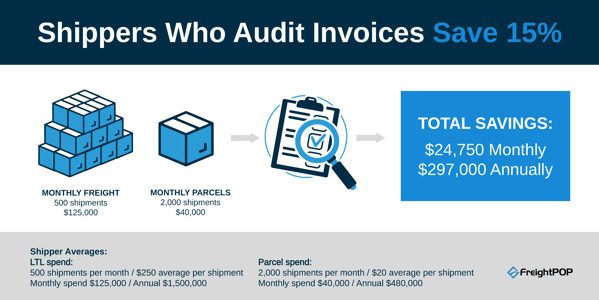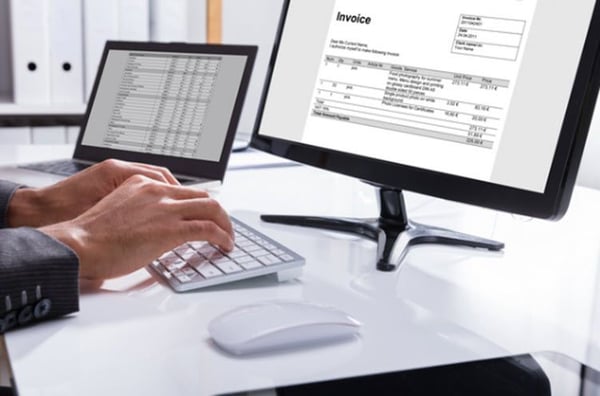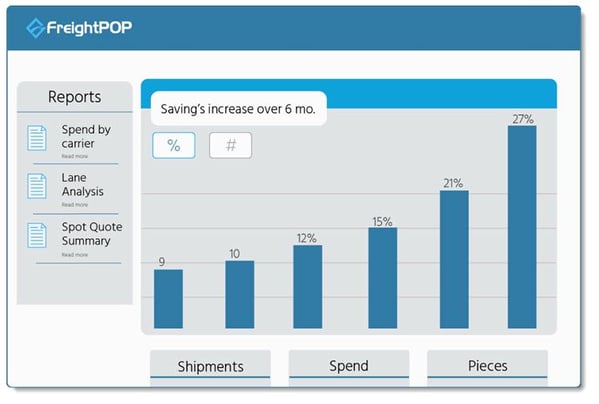FREIGHT INVOICE AUDITING
Find and fix carrier invoice discrepancies for fun and profit
Your company could save 15% by identifying freight carrier invoice discrepancies and requesting refunds for mistakes or failure to meet quoted service delivery.
Why Audit Freight And Shipping Invoices?
Shippers face many unique challenges within their business. Keeping up with customers' increasing demands for free shipping and same-day delivery appetites, coupled with the complexity of shipping rates, can cause a lot of businesses to scrutinize their shipping spend.
So how can businesses stay on top of their shipping spend? Certainly, getting the most bang for your buck starts at the initial rate shopping process. Another avenue to save money that shippers can control is going after the errors and discrepancies carriers make in billing.
Most shippers either do not audit their invoices or use a rather cursory method. But there are far better ways to ensure invoices match the shipping quotes and agreed-upon contracts.
The Savings Potential
On average, shippers save 15% by isolating invoice discrepancies and requesting refunds from carriers. These refunds are for erroneous charges or for a failure of the carrier to meet quoted service delivery.
Some businesses act as though absorbing erroneous shipping charges is just part of the cost of business, however the importance of auditing is pretty clear when the cost of errors is considered in real dollars.
A typical medium-size business ships around 500 LTL and 2,000 parcel shipments a month. Per shipment, LTLs average around $250, and smaller packages average around $20. Those shippers who establish a way to effectively audit and apply for carrier refunds can save up to $24,750 a month - or $297,000 annually!

Ocean freight tends to have an even higher percentage of errors due to a variety of changes based on lane volumes, seasonality, and port congestion. Spot quoting can also compound mischarging issues.
Auditing invoices can be a very complex manual process, which is why most shippers just aren't doing it. Minimally they are conducting "spitball checks" on high ticket shipments, which is a very watered-down version of an audit. Without the right auditing tools, shippers are leaving money right on the table.
“It’s absolutely true that carriers overcharge. If you keep the papers moving around enough, you’ll give up and pay me. And there’s no good way to get that money back.” - Large Volume Shipper Quoted in JOC.com
Centralizing and Automating Freight Invoice Auditing
Avoid the productivity black hole of invoice auditing!
Centralizing and automating the auditing process not only helps businesses go after refunds, but saves on the man-hours of manually carrying out an arduous process.
Manual Freight Invoice Auditing
Someone must review your carrier invoices against initial quotes, isolate a discrepancy, attempt to account for the discrepancy (errors are not always due to a carrier's mistake), and work through making a claim for a refund. Download the Guide!
Carriers don't make it easy to get the data shippers need to audit invoices. Usually, invoices include a top line roll-up of charges. Unless shippers have a way to capture the line itemized quote, they cannot prove where an overcharge is.

Capturing The Data
Let's say a shipper typically uses 8-10 carriers a month. Their first step would be exporting individual carrier information, which usually does not include the original quote details. Line item quotes are not saved for shippers, so they are at a disadvantage in auditing against discrepancies.
Without the right software, shippers are left with an impossible manual process of trying to marry and merge quote and invoice data through spreadsheets and carrier websites to internal data. Without the line detail from the original quote, how can a business determine what, say, a $5 discrepancy even means?
If a shipper uses technology such as a TMS, then they would have all this data upfront. A shipper could then easily compare what was done to what was promised in the original quote.

Centralizing The Data
Shippers use multiple carriers so they can get the lowest shipping rates on a given shipment. It is best practice to "shop for rates", something we cover in detail in our guide Carrier Rate Shopping. Unfortunately, the more carriers used, the more complex auditing becomes.
The goal should be to use a TMS that is a centralizing solution with EDI integrations that pulls all the information, from quote to delivery and invoicing, into one place. This enables shippers to shop rates across a host of carriers and then later, quickly evaluate quotes to invoices.
Download the Parcel Shipping & Freight Auditing eBook!
This also allows shippers to readily scrutinize carrier service levels, another key aspect of invoice auditing. A shipper can apply for a rebate if a quote says two-day delivery and that was not met. However, without this data being pulled into a centralized platform, it would be yet another manual task of pulling up delivery information from another siloed data set.
Outsourcing Invoice Auditing
There are third-party resources that can audit invoices for shippers and take on the responsibility of applying for carrier refunds, however, there are some limitations.
First, outsourcing cuts into refunds. Typically there is a 5-10% internal cost, which means that the 15% refund potential is severely diminished.
Second, third-party auditors have the same limited view of a quote to final invoice information. Auditors do not have a system that customers are shipping through (like a TMS), so they miss capturing line item charge information. Auditors cannot see the fuel, residential, and all the broken-out item charges. As such, they are not better placed to review discrepancies than the shipper. Auditors are only solving the internal labor problem, which still costs the shipper money.

Transporation management systems
A shipper's perfect shipping software solution, or TMS, should include:
- Flexibility & Functionality
- Can the platform scale?
- Are multiple individual users across locations catered for?
- Multi-Carrier & Multimodal Capability
- Can rates be shopped across multiple carriers and modes?
- Workflow Automation
- Does the TMS allow automatic real-time internal and external alerting?
- Ease of Setup & Integration
- Can any device access the TMS?
- Is hardware or on-site setup required? It should be a cloud-type service or you may pay a big implementation fee
- Budget Conscience
- Beware of lengthy contracts or upfront fees!
- Consider a demo option first to monitor ROI
We outline in more detail what shippers should look for in a TMS solution in our 5 Must Haves - A TMS Buyer's Guide.
In terms of auditing invoices, a TMS solution should reveal data not easily accessible otherwise. It should remove the requirement for businesses to pour over invoices, logging in and out of multiple carrier websites to research and apply for refunds.
TMS auditing features should include flagging or internal alerts catching such things as:
- Invoices that do not match shipping quotes
- Duplicate charges
- Incorrect weight and accessorial fees
- Incorrect freight classifications
- Delivery turnaround does not match what was quoted

What To Look For When Auditing Freight Invoices
Beyond keeping an eye out for obvious errors, such as duplicate invoices or an outright wrong bill is sent to a shipper, auditing shipping invoices means a business is keeping a watchful eye on service levels and the actual rates charged.
Service Levels
Service level compliance is one of the top things to audit. If a contracted agreement with a carrier states a delivery-day timeframe and that timeframe is not met, that is a breach of the agreement and the shipper is owed money. Typically 5-10% of deals aren't meeting delivery requirements.

Starter LISt of freight and shipping invoice Errors
There are hundreds of ways invoice charges will not line up to shipping quotes. Sometimes it is due to carrier error, and sometimes it is attributable to a shipper's mistake. Any miscommunication about the nature of a delivery, or if changes are made en route, will lead to discrepancies.
The type of rating errors include (but is not limited to):
- Address Corrections - If a carrier makes an error on the delivery address and there is a price difference on shipping to the correct address, a refund claim can be made
- Customs Fees - Ensure only correct tariffs are applied to invoices
- Delivery Area Surcharge - (DAS) is zip code specific and can be charged in error
- Duplicate shipments
- Duplicate Tracking Number - The carrier is responsible for charges that occur due to their supplying a duplicate tracking number
- FedEx Redelivery Charges - FedEx provides three redelivery attempts per delivery free of charge
- Fuel surcharge errors
- Hazardous Material Fees - should match the quote
- Holiday Exceptions - There are different fee structures for holidays to keep an eye on
- Incorrect exchange rates
- Insured & Declared Value - If there is a discrepancy between the declared value and insured value, a shipper can apply for a refund
- Invalid Residential Surcharge - If a delivery address was commercial, this should not be charged
- Minimum Charges should be applicable if charged
- Unapplied or Incorrect Discounts or Rebates
- Unauthorized Charges - The addition of erroneous surcharges, duties, or taxes can be claimed as refunds
- Wrong weight calculation

Carrier Shipping Agreements
Shippers need to be mindful of their carrier agreements in relation to recourse. They need to ensure that any contracts they sign allow them to audit against service failures or erroneous charges. Avoid contracts that do not allow you to hold the carrier responsible for not meeting the service standard they promise. Late deliveries can severely dampen repeat business and the company's bottom line.
Carrier contracts can be overwhelming with terms and conditions, so it is strongly advised that a consultant is used where management may lack contract negotiation experience.
In Short
Auditing is crucial to businesses that ship. Not only can it help ensure shippers are going after money that is rightfully theirs due to carrier invoicing errors or poor service delivery, but having a good auditing process provides business intelligence. With the benefit of hindsight, shippers can identify trends in discrepancies and potentially find ways to update processes on the front end to avoid issues. And insight can also help businesses make smarter carrier decisions in future by leveraging information in carrier negotiations.


